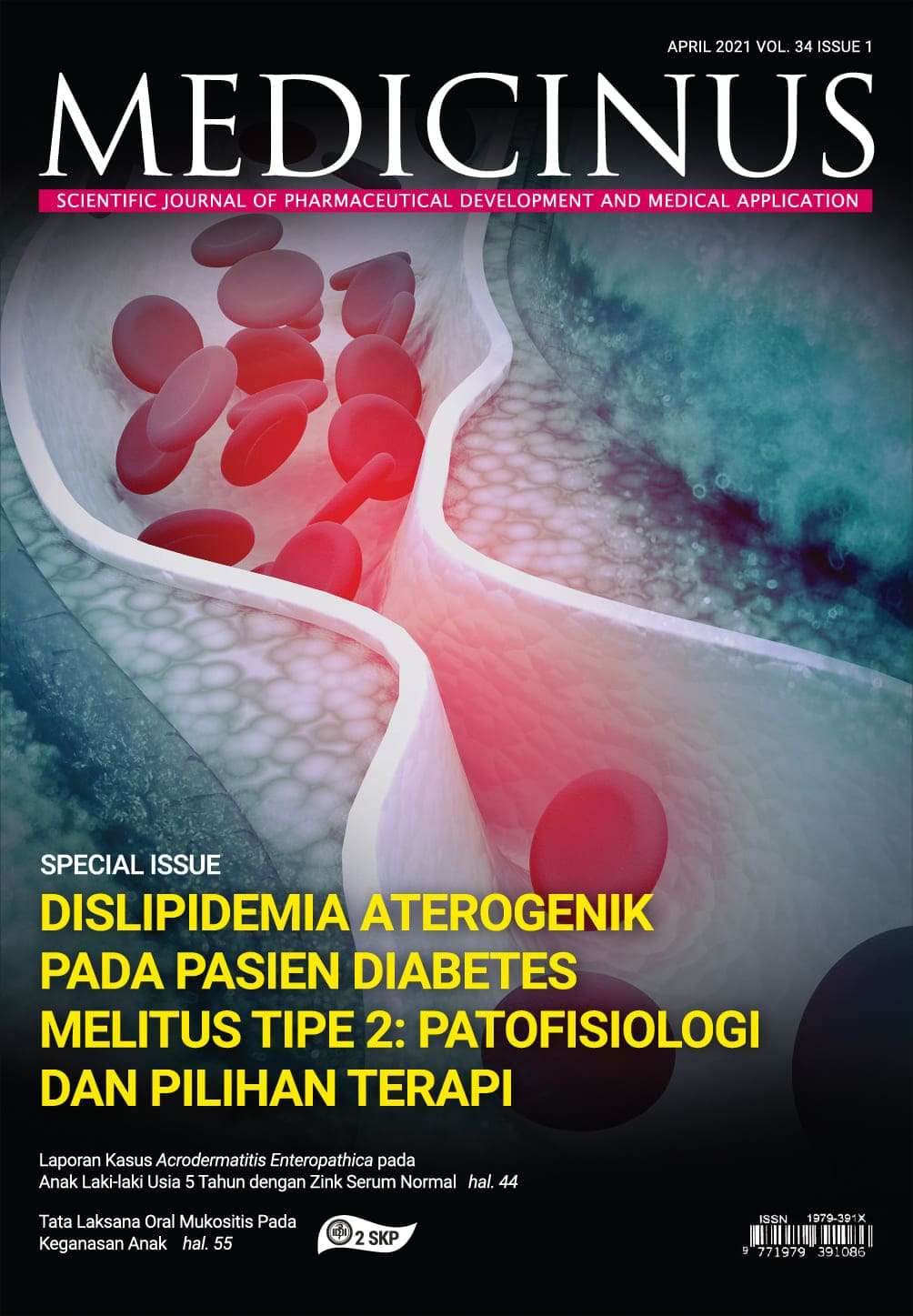Hyperglycemia in Childhood Acute Lymphoblastic Leukemia during Induction Chemotherapy
DOI:
https://doi.org/10.56951/medicinus.v34i1.49Kata Kunci:
leukemia, acute lymphoblastic leukemia, induction chemotherapy, hyperglycemia, corticosteroids, asparaginaseAbstrak
Introduction: Hyperglycemia is a well-known adverse effect of the corticosteroids and asparaginase given during induction chemotherapy for pediatric acute lymphoblastic leukemia (ALL). ALL is a type of hematologic malignancy with high incidence in the childhood. The aim of this study is to investigate the impact of hyperglycemia during induction chemotherapy in childhood ALL.
Methods: This prospective study was done in Dr. Soetomo Hospital from January to April 2018. The subject was newly diagnosed as ALL under the age of 18 years, treated with Indonesian childhood ALL 2013 protocol (standard risk (SR) group and high risk (HR) group). Hyperglycemia was defined as at least two separate random plasma glucose levels >200 mg/dL, which was evaluated before and during induction chemotherapy. Statistical analysis using Paired T-test for parametric and Wilcoxon test for nonparametric.
Results: Thirty-three children were enrolled, 18/33 boys with mean age 5.8 (SD 3.78) years, compromised as ALL-L1 30/33. They were treated with ALL-HR 19/33 and ALL-SR 14/33. In overall groups, the mean random blood glucose level significantly increased from 108 (SD 21.3) mg/dl to 147 (SD 48.1) mg/dl, (mean difference 38.67 mg/dl; 95% CI 18.08 to 59.26 mg/dl, p=0.008). In SR group, there was a significant increase of mean random blood glucose level from 102 (SD 13.5) mg/dl to 133 (SD 37.3) mg/dl, (mean difference 31.8 mg/dl; 95% CI 8.78 to 54.8 mg/dl; p=0.01). In HR group, the mean random blood glucose level increased from 113 (SD 51.9) mg/dl to 165 (SD 25.4) mg/dl, (mean difference 51.9 mg/dl; 95% CI 18.6 to 85.2 mg/dl, p=0.004).
Conclusion: Blood glucose level is significantly increase during induction chemotherapy in both SR and HR Indonesian childhood ALL 2013 protocol.
Unduhan
Referensi
Howard SC, Pui CH. Endocrine complications in pediatric patients with acute lymphoblastic leukemia. Blood Rev 2002;16:225-43. DOI: https://doi.org/10.1016/S0268-960X(02)00042-5
Cetin M, Yetgin S, Kara A, et al. Hyperglycemia, ketoacidosis and other complications of L-asparaginase in children with acute lymphoblastic leukemia. J Med 1994;25:219-29.
Pui CH, Burghen GA, Bowman WP, et al. Risk factors for hyperglycemia in children with leukemia receiving L-asparaginase and prednisone. J Pediatr 1981;99:46–50. DOI: https://doi.org/10.1016/S0022-3476(81)80955-9
Baillargeon J, Langevin AM, Mullins J, et al. Transient hyperglycemia in Hispanic children with acute lymphoblastic leukemia. Pediatr Blood Cancer 2005;45:960-3. DOI: https://doi.org/10.1002/pbc.20320
Roberson JR, Raju S, Shelso J, Pui CH, Howard SC. Diabetic ketoacidosis during therapy for pediatric acute lymphoblastic leukemia. Pediatr Blood Cancer 2008;50:1207-12. DOI: https://doi.org/10.1002/pbc.21505
Dundar B, Eren E, Oktem F, Dundar N, Tunc B, Canatan D. Hyperosmolar non-ketotic syndrome in a child associated with L-asparaginase and prednisolone. Pediatr Int 2007;49:256-7. DOI: https://doi.org/10.1111/j.1442-200X.2007.02332.x
Venkatraman R, Jayashree M, Singhi S, Marwaha RK. Hyper- glycemic hyperosmolar nonketotic syndrome in a child with acute lymphoblastic leukemia undergoing induction chemo-therapy: case report. J Pediatr Hematol Oncol 2005;27:234-5. DOI: https://doi.org/10.1097/01.mph.0000161530.40065.2f
Sonabend RY, McKay SV, Okcu MF, Yan J, Haymond MW, Margolin JF. Hyperglycemia during induction therapy is asso- ciated with poorer survival in children with acute lymphocytic leukemia. J Pediatr 2009;155:73-8. DOI: https://doi.org/10.1016/j.jpeds.2009.01.072
Roberson JR, Spraker HL, Shelso J, Zhou Y, Inaba H, Metzger ML, et al. Clinical consequences of hyperglycemia during remission induction therapy for pediatric acute lymphoblastic leukemia. Leukemia 2009;23:245-50. DOI: https://doi.org/10.1038/leu.2008.289
Hwangbo Y and Lee EK. Acute Hyperglycemia Associated with Anti-Cancer Medication. Endocrinol Metab 2017;32:23-9. DOI: https://doi.org/10.3803/EnM.2017.32.1.23
Developed by the National Center for Health Statistics in collaboration with the National Center for Chronic Disease Prevention and Health Promotion. CDC 2000;11:13-4.
Banihashem A, Ghasemi A, Ghaemi N, Moazzen N, Amirabadi A. Prevalence of transient hyperglycemia and diabetes mellitus in pediatric patients with acute leukemia. Iran J Ped Hematol Oncol 2014;4: 5-10.
Lowas SR, Marks D, Malempati S. Prevalence of transient hyperglycemia during induction chemotherapy for pediatric acute lymphoblastic leukemia. Pediatr Blood Cancer 2009;52:814-818. DOI: https://doi.org/10.1002/pbc.21980
Weiser MA, Cabanillas ME, Konopleva M, et al. Relation between the duration of remission and hyperglycemia during induction chemotherapy for acute lymphocytic leukemia with a hyperfractionated cyclophosphamide, vincristine, doxorubicin, and dexamethasone/methotrexate-cytarabine regimen. Cancer 2004;100:1179-85. DOI: https://doi.org/10.1002/cncr.20071
DeFronzo RA, Del Prato S. Insulin resistance and diabetes mellitus. J Diabetes Complications 1996;10:243-5. DOI: https://doi.org/10.1016/1056-8727(96)00046-3
Pastore G, Saracco P, Brach del Prever A, Iannacci L, Mini- ero R et al. Glucose metabolism in children with acute lymphoblastic leukemia treated according to two different L- asparaginase schedules. Acta Haematol 1984;72:384-7. DOI: https://doi.org/10.1159/000206424
Skomra S, Przybylska T (1992) Transient diabetes mellitus with ketoacidosis in a child during the treatment of acute lymphoblastic leukemia with L-asparaginase. Pol Tyg Lek 1992;47:31-2.
Maria Moschovi. Hyperglycemia and Diabetes Mellitus in Children with Acute Lymphoblastic Leukemia. J Hematol Diabetes 2018;2:1-3.
Unduhan
Terbitan
Bagian
Diterbitkan
Unduhan
Lisensi
Hak Cipta (c) 2021 Nengcy Erlina Tasik Rerung, Andi Cahyadi, Nur Rochmah, Maria Christina Shanty Larasati, Mia Ratwita Andarsini, Muhammad Faizi, IDG Ugrasena, Bambang Permono

Artikel ini berlisensi Creative Commons Attribution-NonCommercial 4.0 International License.




